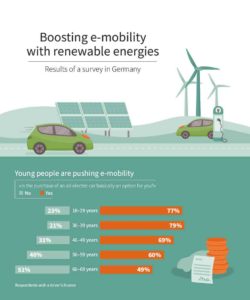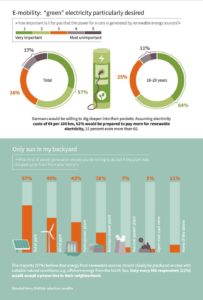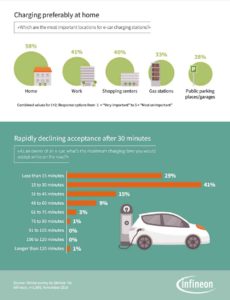
Two-thirds of all German motorists can imagine buying an electric car. This is the result of a representative survey conducted by Statista on behalf of Infineon Technologies. Younger drivers are more open to e-cars, and are now boosting e-mobility: In the age group between 18 and 39 years, the approval rate for e-mobility is almost 80 percent. In the age group of the 60 to 69-year-old, however, only around 50 percent approve. The willingness to buy an e-car increases with income: At 74 percent, participants with a monthly net household income of 4,000 Euro and above show the greatest willingness to buy an e-car.
 The participants of the study want in particular “green” electricity for e-mobility. Nearly 60 percent of those surveyed consider this important (27 percent) or very important (30 percent). It is striking that here, too, the assessment is strongly dependent on age. The younger the respondents, the greater is the value placed on renewable energy sources as an electricity supplier for emission-free driving.
The participants of the study want in particular “green” electricity for e-mobility. Nearly 60 percent of those surveyed consider this important (27 percent) or very important (30 percent). It is striking that here, too, the assessment is strongly dependent on age. The younger the respondents, the greater is the value placed on renewable energy sources as an electricity supplier for emission-free driving.
“Already today, all passenger transport could be powered exclusively by renewable energies,” said Peter Wawer, Division President Industrial Power Control at Infineon. In 2017, 547 terawatt hours (TWh) of electricity were generated in Germany, of which 143 TWh were generated by solar and wind power. This would be enough for around 47.7 million vehicles, with 46.5 million cars currently registered in Germany.* “The biggest challenge in switching from combustion engines to electric motors is to set up a charging infrastructure, and to upgrade existing power grids. In Germany, these are not yet sufficient for the higher performance required by e-mobility. Especially if the grid is also to tolerate a higher proportion of renewable energies.”
 Germans would be willing to pay extra for this “clean” e-mobility. Assuming electricity costs of 4 euros per 100 km, 62 percent would be prepared to pay more for renewable electricity. 15 percent would dig deeper into their pockets, and spend more than 6 euros on a 100 km charge – if they could be sure that the electricity was not produced by nuclear or coal power plants.
Germans would be willing to pay extra for this “clean” e-mobility. Assuming electricity costs of 4 euros per 100 km, 62 percent would be prepared to pay more for renewable electricity. 15 percent would dig deeper into their pockets, and spend more than 6 euros on a 100 km charge – if they could be sure that the electricity was not produced by nuclear or coal power plants.
“Not in my backyard”
The majority of participants believe that electricity from renewable energy sources should be generated where conditions are particularly good. This applies, for example, to offshore wind farms in the North Sea. However, only 21 percent accept large power lines if they run less than 5 kilometers from their place of residence. Germans find renewable energy generation least disturbing in the environment: solar parks enjoy the highest level of acceptance, followed by wind parks, hydropower plants and biomass plants.
 The high level of approval for solar parks is even higher among the survey participants for whom an e-car is an option. 74 percent would accept a solar park within a radius of 5 kilometers of their home (67 percent in total). Conversely, 18 percent of respondents who are unwilling to use an e-car reject all forms of energy generation in their own vicinity. In comparison, only 7 percent of the participants in the study, for whom an e-car is an option, reject it. Nuclear power plants and open-cast coalmines clearly lag behind in terms of acceptance, with rates of 7 and 5 percent, respectively.
The high level of approval for solar parks is even higher among the survey participants for whom an e-car is an option. 74 percent would accept a solar park within a radius of 5 kilometers of their home (67 percent in total). Conversely, 18 percent of respondents who are unwilling to use an e-car reject all forms of energy generation in their own vicinity. In comparison, only 7 percent of the participants in the study, for whom an e-car is an option, reject it. Nuclear power plants and open-cast coalmines clearly lag behind in terms of acceptance, with rates of 7 and 5 percent, respectively.
Charging: preferably at home, and under 30 minutes on the road
There is a clear preference when it comes to charging e-cars: the interviewees prefer to “refuel” at home. Significantly fewer people prefer charging at work, which is almost on par with charging at shopping centers, gas stations and public parking garages. An obvious barrier for charging on the road is a 30-minute time limit: 70 percent of respondents are not willing to accept longer charging times. This is another reason why different providers are setting up an infrastructure for fast charging both in cities and along the motorway. New materials for semiconductors such as silicon carbide are making this possible. With the appropriate battery, electric vehicles can be charged within minutes at a charging power of 350 kW.
Apparently, charging at home is so popular because the car can be charged “in passing” even with longer charging times – overnight, for example. However, most people do not know what other activities they can engage in while their batteries are being recharged. Less than half know where the nearest charging station is.
Summed up: Learn more about electric charging or all you need to know about electromobility, in Infineon’s Discoveries.
Survey period: End of November 2018. 1,690 people in Germany were interviewed for the representative online survey.
*Based on the assumption that a car travels an average of 15,000 km per year and requires 20 kWh per 100 km. Source: Kraftfahrt-Bundesamt (Federal Office for Motor Vehicles); Fraunhofer Institute, “Power generation in Germany”















